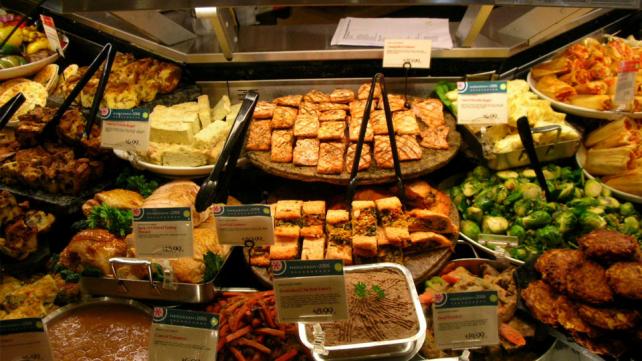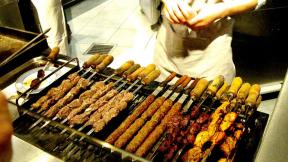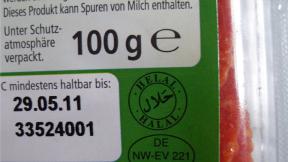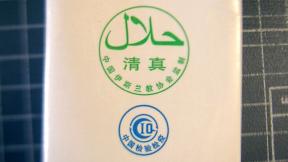
Often times Muslim consumers tend to assume 'Kosher' is similar to 'Halal'. Although the slaughtering rituals of Jewish people resemble those of Muslims; kosher and halal are two different entities carrying a different meaning and spirit. Muslims, therefore, are provided with the following basic information about Kosher so they can exercise care in distinguishing halal from kosher.
Kashrut (in Hebrew) is the system of Jewish dietary laws. Kosher (kashur in Hebrew) means 'fit, or proper for use' according to Jewish law. Examples of kosher are: the meat of the 'fore quarter*' of the cattle slaughtered ritually, fruits, vegetables, all fish that have fins*, Kosher wines*, Kosher cheeses*, Kosher gelatin*.
The opposite of Kosher, as applied to food in Treif (in Yiddish), or trefah (in Hebrew) meaning 'not suitable for use', or 'forbidden'. Trefah literally means 'torn by a wild beast' (Exodus 22:30). Examples of Trefah are: blood, swine, rabbit*, all shell fish*, wild birds such as wild hen*, wild duck*, and the birds of prey.
(*) These food items exhibit a marked difference between kosher and Halal as well as trefah and haram. The differences are explained elsewhere in this section.
Caution to Muslim Consumers:
Halal is a comprehensive Islamic term encompassing not only the matters of food and drink, but all other matters of daily life. Islam being the final and perfect way of life for humanity, it supersedes all the previously revealed religions including Christianity and Judaism. The rituals in all matters were perfected by God (al-Quran 5:3)
According to Islamic Jurisprudence, no one except God can change forbidden (Haram) things into lawful (halal) for vice-versa. It is forbidden for people to change the lawful (Halal) things into unlawful (Haram), or vice-versa.
Halal is a unique Islamic concept and eating zabiha (Islamically slaughtered) meat is a distinguishing part of a Muslim's identity as expressed by Prophet Muhammad, peace and blessings be upon him.
Salient differences between kosher and halal are:
Islam prohibits all intoxicating alcohols, liquors, wines and drugs. kashrut regards their wines kosher. Hence food items and drinks showing the kosher symbol containing alcohol are not halal.
Gelatin is considered Kosher by many Jews regardless of its source of origin. If the gelatin is prepared from non-zabiha, Muslims consider it haram (prohibited). Hence foods items such as marshmallows, yogurt, etc., showing kosher symbols are not always halal.
Enzymes (irrespective of their sources even from non-kosher animals) in cheese making are considered mere secretion (pirsah b'almah) according to some kashrut organizations, hence all cheeses are considered kosher by many Jews. Muslims look for the source of the enzyme in cheese making. If it is coming from the swine, it is considered haram(forbidden). Hence cheeses showing kosher symbols may not be halal.
Jews do not pronounce the name of God on each animal while slaughtering. They feel that uttering the name of God, out of context, is wasteful. Muslims on the other hand pronounce the name of Allah on all animals while slaughtering.
The salient differences between kosher and halal have been illustrated so that Muslim consumers can distinguish halal from kosher.
Muslims in non-Muslim countries should strive to follow the Islamic injunctions in their diet (as well as in every walk of life) and establish their own businesses and institutions to cater to the needs of the Muslim Ummah. By doing so, not only the identity of the Muslims will be preserved, but they will be recognized and respected for their beliefs and practices.
Differences within Kosher:
There are different sects within Judaism and there are several hundred Jewish Kosher authorities in the US who certify Kosher based on extremely liberal to extremely conservative rules. Therefore it is difficult to come up with one uniform opinion regarding Kosher practices. A symbols "k" for kosher is not governed by any authority. Any manufacturer can use it at will. A website guiding Jews about Kosher states "it may take a great deal of detective work to ascertain the standard that a particular rabbi is using." For this reason many Muslims when buying anything kosher look for "u" in a circle which are more conservative Kosher symbol.
"Hanukkah dishes" by Ms Jones from California, USA - Happy Hanukkah!. Licensed under Creative Commons Attribution 2.0 via Wikimedia Commons - http://commons.wikimedia.org/wiki/File:Hanukkah_dishes.jpg#mediaviewer/File:Hanukkah_dishes.jpg








Comments
Very useful information
Very useful information
Location
Salam Alekum! Thank you for
Salam Alekum! Thank you for your opinion, it is inaccurate regarding Kashrut and I do not want to speculate on your sources. The only issue that Muslims should be aware is on Alcohol since it is forbiden in their practice by the Holy Quram. Judaism Kashrut Laws are well rounded and strict on the observance of this discipline which goes beyond food and drinks and includes all aspects of life. For sure it is intended for Jewish people and the blessings also pertain to Jewish People. All the Laws are written and accessible to anyone, there is nothing secred or hidden and regardless of the symbols all those in charge of Kashrut follow the uniform Laws of Kasrut to the best of their abilities. The Symbols are the trademark of each authority since there is not higher authority than HaShem. Some people trust more the authority closer to their community but it is a personal choice rather than flaws. Muslims are good people and have closer resemblance to Jewish practices, we must remember that the political conflict is not a religious conflict and it runs contrary to Islamic tradition and teachings as you may easily read in the Holy Quoran. Most Jewish People respect your practices and any religion regardless of politics. Please do not fall into prejudice since Judaism as well as Islam have the purpose to better humanity and to serve the only One Allah-Elhohim. Have a wonderful day.
Location
You really need to check your information, especially the sections on wine, gelatin and cheeses. There are some huge mistakes in this article. If it was your intention to give false information then you have done so. If it was your intention to provide legitimate, genuine and truthful information regarding Kashruth then you totally blew it. None of the Orthodox Jews that I know, including myself hold to the standards and information that you have described in this distorted article.
Location
Some people are getting angry and worked out. We should be thankful to them for giving us such valuable information. However, everybody got right to correct them when they err
Location
I know all about kosher laws and I came to the sight to learn about Islamic law. I was shocked to see that you have reported some misinformation about kashrut. Laws around cheese and gelatin are incorrect, vegetable enzymes are used and kosher gelatin is fish gelatin. Slaughtering is done by non-rabbis as well as rabbis and lay people do it all the time. Please check your information.
Location
I think that more detail regarding Kosher practices with some evidence would be very beneficial. The Quran does however state in regards to the food of the Jews and Christains: " This day are(all) good things made lawful for you. The food of those who have received the scripture is lawful for you, and your food is lawful for them." Quran (5:5)
Location
For the person who criticized sound vision from coping from the website http://www.halalscience.org/en/main2010/content.php?page=sub&category=15..., that website actually soundvision as their source at the bottom of the article. Jajakallah khair.
Location
Thanks Edy, i agree with your opinion !
Location
You make a number of very serious errors about things which are kosher. In every case you misrepresent the laws of kashrut as being more lenient than those pertaining to halal food. Except in the matter of wine they are much stricter
Location
Salam, Shalom,The most important thing is the intention to do something in the righteous manner and good deed. Strictly speaking in food and beverages, halal can be as high as: mandatory (wajib), priority (sunnah), allowed (makruh), or even wrongdoing (e.g. life threatning)..thus depends on the situation and circumstances moslems can eat kosher (vice versa, according to Quran 5:5). I believe we already knew from previous posts.Anyway, I hope you gain something useful. If you think it is righteous, do it..unsure about something, leave it..think it isn't right, leave it. For you is your religion, for me is my religion. Mistakes are mine, the right ones are His. Wallahualam.PEACEAdy
Location
Pages
Add new comment